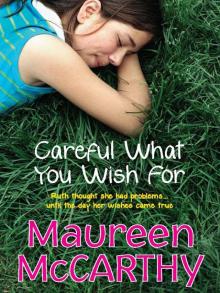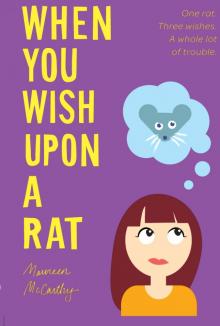- Home
- Maureen McCarthy
When You Wish upon a Rat Page 2
When You Wish upon a Rat Read online
Page 2
There’d been no mention of her birthday over dinner the night before. All the talk had been centered on the boys, as usual. Marcus had won a scholarship to a music school for the following year, and he’d also been invited to try out for the state cycling team. Not to be outdone, Paul had insisted on showing them all how he could now read hard books. There was lots of patting him on the back and joking about how he was going to become the next Einstein. Ruth could distinctly remember reading The Hobbit in the third grade—a much harder book than Dr. Seuss—but she didn’t remember anyone suggesting she was going to end up inventing anything. The signs did not look at all promising for her birthday.
“Rise and shine!”
The bedroom door flew open and Ruth’s mother crashed in like a tank preparing for battle. “We have to be gone by seven, remember!” Mrs. Craze flipped the blind up with one plump brown hand. “So get a wriggle on!”
Ruth could only blink furiously against the light blasting into her eyes and try to pretend she was somewhere else. In her ideal world no one would ever say get a wriggle on, much less yell it at someone who could well be still asleep.
Mrs. Craze’s short, round body was encased in a figure-hugging purple tracksuit with a bright yellow turtleneck underneath, and she was wearing an old pair of Marcus’s gym shoes with gold stripes down the sides. Ruth had to wonder sometimes if her mother ever looked in the mirror, because if she did right at that moment, even she would have to admit that she looked like an oversized Violet Crumble.
“Remember to bundle up,” Mrs. Craze ordered on her way out. “It’s freezing outside.” She stopped at the door. “Oh, by the way, I’m afraid old Flip had a go at your red sweater last night.”
“What?”
“You left it on the veranda!”
“I did not.”
“Oh, come on, sourpuss.” Mrs. Craze sashayed out of the room, her thick gray hair bouncing around her shoulders like tufts of steel wool. “It’s not a tragedy, you know!”
The door slammed shut.
“It is to me!” Ruth yelled back.
“We’ll get you another one!”
“When?”
But her mother was out of earshot.
Ruth swung her feet over onto the cold floor. Only last week her other halfway decent piece of clothing, a crisp white shirt that had belonged to Mary Ellen, had come out bright pink from the wash. Her mother hadn’t bothered to consider that it shouldn’t go in with the el cheapo Indian tablecloth she’d gotten at the two-dollar shop. Ruth walked to the chair where she had laid out her clothes—the way she did every night before going to bed—and started putting on her socks. Then she stopped for a moment.
“Ruth Craze,” she told herself firmly, “one day your life will improve.”
She was pulling on her sweater when she remembered exactly why she’d been woken so early, and her whole mood plummeted another ten notches. Marcus was competing in a bike race in a country town three hours away and they all had to go. This was the family rule. It would mean standing all day with crowds of noisy, sports-mad people shouting and screaming and jumping up and down as they watched the races.
Ruth ran to the bedroom door, her pajama bottoms flapping around the calves of her long legs, hoping against hope that there might be some way out of it.
“Do I have to go today?” she called down the hallway.
“Of course you have to come, Ruth!” her mother called back.
“I could stay and clean the house.”
“Oh, don’t be silly!”
“I could do your accounts.” Ruth was the only one in her family with a head for figures. “You and Dad are way behind with your taxes.”
“Worrywart!”
“I’m not!”
“Marcus might get into the state team,” her mother called. “He needs us all to cheer him on!”
“Hey, Ruth, do you know where my long black socks are?” her father cut in. “You know, the ones that—”
“In the washing basket,” Ruth shouted back. Where do you think they’d be … on the roof?
Ruth was also the only one in the family who could ever find anything.
“Not here!” her father called. “Hey, Ruthie, they’re not here.”
Fully dressed now, in jeans and her least-favorite pale yellow sweater, Ruth turned off the light and went to the window. Outside, the day was breaking nicely.
She sighed and wondered for the millionth time what terrible thing she might have done in a previous life to be left alone with this messy, absentminded family.
Her father was a paint salesman who thought he was an inventor. He spent every spare moment experimenting with new creations that he was sure would catapult the family into instant wealth. Last year it had been pumpkin-flavored ice cream and cardboard chopsticks; this year it was a tea bag that didn’t go soggy in water, along with flavored disposable pens for those who wanted to chew while they were writing! Meanwhile, there was no money for anything. None of his schemes had made the Craze family even one dollar—in fact, they cost money, and the big shed at the back of the family home was testament to that. It was full of his failed inventions. There were bits and pieces of them all over the house as well. But in spite of all the spectacular failures, he had a business card that said Mr. Kenneth Craze: Entrepreneur and Inventor.
“Dad, you’re a salesman!” Ruth sometimes felt compelled to remind him. “Why don’t you concentrate on that?”
But he would just smile in that vague, dopey way he had when he wanted to get out of an awkward situation. “I know, Ruthie. I know. But one day it’s going to change, you’ll see.”
Her mother was worse, if that was possible. She was a part-time social worker, always puffing around and running late and getting outraged at the government over something. When she wasn’t at work or running after Marcus and Paul, she was in the other half of the back shed covered in wet clay, chucking lumps of it onto the wheel and trying to be an artist.
“Mum, when are you going to make something we can sell?” Ruth often asked grimly. Ruth knew that nothing her mother made was in any way sellable, but she needed to make the point that there should be some purpose to all those hours her mother spent in the shed.
All her friends had nice houses, and rooms with matching furniture and pretty bedspreads and expensive toys that they left strewn about like they were nothing. Most of them had mobile phones and computers and sometimes even their own televisions as well. Their parents seemed perfectly content to be secretaries and pilots and nurses and teachers and doctors and lawyers. Why was she the only one without a nice, quiet place to read and do her homework? Her parents were always telling her to invite her friends over, but Ruth never did. Everything was worn and grimy, tattered and old. There was no cable TV and no DVD player, and there was hardly ever anything really nice to eat.
“Can you come and find my socks, Ruth?” her father shouted. “We’ve only got fifteen minutes.”
“Coming!”
On her way down to the kitchen, Ruth stopped in front of the cracked mirror in the hallway. She looked exactly how she felt on the inside: serious and wary. She tried a smile, but it made her look nervous rather than pleased, tense rather than glad.
She shoved her hair back from her face with both hands and leaned in closer, trying to work out what someone who didn’t know her would think. What would a stranger think of Ruth Craze?
There was nothing exactly wrong with her face. No recessed chin, unsightly bumps, splotchy skin, or dark birthmarks, but there wasn’t much right about it, either. Her chin was pointy and her mouth small and straight, her forehead high and her neck thin. A hard mouth, Ruth thought, like a mean old woman in a fairy tale. At least her eyes were an interesting color, greenish gray like the leaves of a eucalyptus tree. They were large and fringed with heavy, dark lashes. Ruth let her hair fall down around her face again and took a step back, deciding that plain would be the best description. She was like any other tall, plain girl standing on the
road waiting for a bus. The nice eyes were probably meant for somebody else.
The week before, she’d heard her mother talking to her sister Faye. What can I do with her? her mother had moaned. She won’t even smile anymore.
She’s going through a gawky stage. Auntie Faye had sighed, as if she knew all about it.
Gawky. Ruth didn’t like that word one little bit.
She turned sideways to try to get a look at the nose that her former best friend Lou had told her was “beaky.” Did that mean it was too long or that it was the wrong shape or that she really did look like a bird? Her dark hair was long, thick, and straight. Before she fell out with her friends, she had been rather proud of it, and of the fact that she was tall. Now every time they passed her in the corridor or on the playground, they’d hiss something like beanpole under their breath, or skinny arse.
The boys were more straightforward. What’s the weather like up there? they’d yell at her on their way out to smash each other at cricket. The latest rumor around the school was that she was bulimic. Hey, Ruth, why don’t you go chuck up? That would be funny if it weren’t so absolutely not the case. Ruth ate a lot, and she never chucked up even when she felt sick or had a pain in the stomach. But she never told any of them that. She never said anything.
Ruth pulled up her hair in an elastic band and went back to the main subject that had been preoccupying her on and off for the last ten months. Why … why … why…? Why did Mary Ellen have to die when there were so many horrible people still left alive in the world? Why did her quiet, funny, young, pretty, soft-speaking, tall and slim and interesting aunt, who was ten years younger than Auntie Faye and seven years younger than Ruth’s own mother and who—it had to be said—had been Ruth’s favorite person in the whole world, die, when all the mean, cruel, boring ones were left alive? It wasn’t right. It wasn’t fair. It didn’t make sense at all. But there was no getting away from it. She was dead.
Ruth walked into the kitchen to find her father sitting at the table eating a bowl of cereal and staring blankly at the blaring television. Some man in a suit was saying that the stock market had crashed, and her dad was shaking his head. Ruth knew for a fact that Mr. Craze didn’t have money invested, so why should he care?
Her mother was making sandwiches. Marcus was doing stretches as he waited for his toast to cook, and Paul was eating cereal with one hand and trying to make some kind of construction out of the three or four bits of toast on his plate with the other.
“Hi, Ruthie.” Paul smiled through a mouthful of Weetabix.
“Hi, Paul.”
“How many inches did you grow last night?”
“Shut up, moonface.” Ruth slunk past into the laundry.
“Mum, she called me moonface!”
“Ruth.” Mrs. Craze sighed. “Don’t tease him.”
“He started it!”
“Be proud of your height, Ruth.” Mrs. Craze pulled a cardboard box out from under the table. “I wish I had some of it.”
“Yeah,” Ruth muttered under her breath. Everyone wanted to be tall, except when they were tall and getting taller and didn’t know when they were going to stop getting taller still. What if she grew into one of those freaks who had to buy their clothes in a special tall women’s shop? Her little brother’s round face was actually quite cute, but she had to pick on him about something when he turned smart on her.
She pulled a pair of long black socks out of the bottom of the washing basket and held them up for her father to see.
“Oh, thanks,” he said distractedly. “Where were they?”
“In the basket.”
“Sweet,” her father said, and then grinned at her as if he’d said something hilarious.
Ruth frowned. Her father’s attempts to be funny were always so totally pathetic. She went to the sink and washed herself a bowl and a spoon from last night’s pile of dirty dishes. Next he’d be saying wicked or sick or … radical. Last week he’d said Don’t get bent, Ruthie when she’d complained about the bread being stale. It had been so excruciating, she’d had to leave the room.
“Have you seen your father’s wallet?” her mother asked. “He left it here last night. You were cleaning up last night.”
“No,” Ruth said, and then had a bet with herself that there would be no milk left, which would mean her having to go to the shop, which in turn would mean the usual scrounging around for coins in the bottom of bags and in pockets because there wouldn’t be any money left after takeout the night before, this not being pay week. Sometimes it was less trouble to not have any breakfast at all.
“Please think, Ruth!” her father begged without taking his eyes off the screen.
“I am thinking!” Ruth said indignantly, opening the fridge door. Wonder of wonders! At least half a liter left. She pulled the container out and set it on the table, then plonked herself down, filled her bowl with cereal, and began to pour the milk.
“She never does anything but think,” Marcus sniggered.
“He’s got a point there,” her father said, still not taking his eyes off the television. “You do think too much, Ruthie!”
“No I don’t.”
“Well, you’re always frowning.”
“No I’m not!”
“Thinking too much can give you headaches.” Mrs. Craze turned from where she was putting the piles of sandwiches into plastic ice-cream containers. “It’s been proved.”
“By who?” Ruth asked.
“The statistics are everywhere,” her mother declared with an airy laugh.
Ruth gave her mother a hard look. Was she serious?
“So I get sick and I die,” she mumbled. “Sweet.”
“Don’t be such a glum bum.” Her mother sighed again. “I was joking.”
“No you weren’t.”
“Yes I was.”
Marcus was lying on the floor in his bright green Lycra racing gear, raising each leg slowly before lowering it again, his face red with exertion. Suddenly, he stopped what he was doing and sat up.
“I’m going to need someone to hold my stuff and refill my water bottle while the race is on,” he exclaimed. “I forgot to organize it.”
“Oh, darling, I’d love to,” Mrs. Craze said, “but I’ll be working the hot dog stand.”
“Dad?”
“I’m going to be up in the judge’s pavilion,” Mr. Craze said. “Remember they asked me?”
“What am I going to do? I’ll be the only one without support.”
“Calm down,” Mr. Craze said. “It will work out.”
“How?”
“We’ll find someone!”
“What about her?” Marcus said, pointing at Ruth.
They all turned around to where Ruth was sitting quietly at the table trying to eat her breakfast and disappear into thin air at the same time. She’d been half expecting something like this to happen.
“Oh yes. That’s a good idea,” Mrs. Craze said breezily. “Ruth can do it. Wonderful. That solves that.”
“No,” Ruth snapped, taking a huge mouthful of cereal.
“Why not?”
“Why should I?” Ruth tried to swallow her food. “I’m not interested in cycling.”
“Honey, it will give you something to do,” Mrs. Craze said encouragingly, above the din of the weather forecast. “You always say you’re bored at these events.”
“No.”
“Ruth!” Mr. and Mrs. Craze, Marcus, and Paul howled indignantly.
“It’s your brother!” her mother begged.
“So?”
“You can help him out.”
“When does he ever help me out?” Ruth grumbled.
“It won’t hurt you.” Her father stared at her over his glasses. “It’s only a few hours. Don’t be a drama queen!”
“Do you have any idea how long a few hours is when you’re doing something you hate doing?” Ruth said sourly.
For some reason both her parents burst out laughing.
“We do ac
tually, Ruthie,” her father said.
“What else were you planning to do?” Marcus grinned. “Sneak off with a book?” He looked around at the others. “Remember the concert last year!”
“I didn’t read while you were playing!” Ruth retorted.
“Still, it wasn’t very nice,” Mrs. Craze said gravely. “Not very nice when a whole lot of people who have practiced all year are trying their hardest and giving their all.”
Ruth rolled her eyes and took another mouthful of cereal. Not very nice? That concert had gone on for hours! So what if she’d quietly read a book? What harm did it do?
“It’s not fair,” Ruth exploded. “He would never do it for me!”
“But you don’t ride,” Paul chipped in, “so how can he?”
“Be quiet, Paul!”
“No offense, Ruth, but you’ve got no friends,” Marcus said lightly. “So what else would you do?”
Ruth gulped and stared at him for a moment before turning away.
There was an odd pause, and they all stopped what they were doing. Her father turned down the television, looked questioningly at Ruth and then at his wife, then to Marcus and back to Ruth.
Ruth could feel a blast of heat rushing up into her cheeks. She was filled with a sudden wild urge to chuck her bowl straight at her brother’s head. How nice it would be to see all the slushy cereal sliding down his acne-spotted face.
“Ruth has friends,” she heard her father say.
“She doesn’t,” Marcus said quietly as he examined a hole in his sport sock.
“What about Lou and … those other nice girls?” Mrs. Craze asked uncertainly.
“They don’t like her anymore,” Marcus informed them.
Ruth stuffed another spoonful of Weetabix into her mouth to ward off the misery rising in her chest. She stared at the wall in front of her as she chewed. As though they knew anything about her! As though any of them had any idea what her real life was like! Even if she sat them down and told them everything that went on at school, they wouldn’t get it. She took another spoonful and tried to think about something nice. A trip to Disneyland would be good. Her own bungalow out back with separate kitchen facilities would be even better.

 Careful What You Wish For
Careful What You Wish For When You Wish upon a Rat
When You Wish upon a Rat The Convent
The Convent Queen Kat, Carmel and St Jude Get a Life
Queen Kat, Carmel and St Jude Get a Life Rose by Any Other Name
Rose by Any Other Name